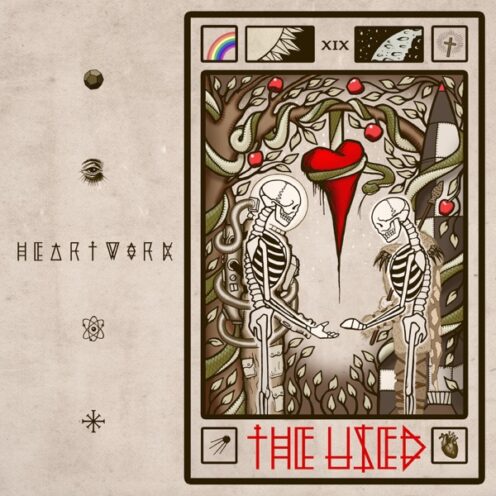
There were a lot of moving parts that came together to make Heartwork, the eighth full-length studio album from The Used. For starters, the band made the conscious effort to reconnect with their longtime collaborator/producer John Feldman. The Used also welcomed a new guitarist, Joey Bradford, into the fold for this album as a permanent band member. Lastly, the band decided to use some outside collaborations, including Travis Barker, Mark Hoppus, Jason Butler, and Caleb Shomo, to enhance their sound on this album further. All of these efforts paid off as The Used have created one of their strongest and most cohesive albums in years.
The album blasts off with the energetic “Paradise Lost, a poem by John Milton” that begins to recapture the magic that was missing from a lot of the more recent The Used releases. The catchy opener finds lead vocalist Bert McCracken as charismatic as he’s ever been when he sings, “Found the key but couldn’t open the cell / This selfishness was part of saving myself / From you now I hold the disease / Planted the poisonous seed / Tried not to eat from the tree / Will I survive? / It’s so hard to tell.”
“Blow Me” follows the great opener with some abrasive guitars courtesy of Bradford, but unfortunately, the song never really connected with me. It’s a strange choice of an introductory single to an album that has a lot going for it, but this track ended up being one of the lower spots for me. “Big, Wanna Be” sets things back on track pretty quickly with some stomping beats and more melodic elements that make for a more comfortable listening experience.
Other tracks in the first half of the LP, such as “Wow, I Hate This Song” target the lack of variety on the radio stations these days with some tongue-in-cheek lyrics and an aggressive pre-chorus that bleeds away into a catchy and melodic chorus. What was initially intended to be one of the possible filler tracks on the album ended up being one of the brighter spots on the record. As catchy as the track above was, “Cathedral Bell” kept being the one song that I kept coming back to on repeat listens. It features a pulsating beat, some near hip-hop elements, and a solid groove throughout. It was one of the more creative songs that The Used have put on an album in years, and it helps even out the entire record.
“1984 (infinite jest)” closes out the first half of the record with some elements that the band used on previous albums such as Lies for the Liars. From the orchestral sections that blend into the aggressive guitar playing, it reminded me a lot of what The Used had become known for on the albums that followed their debut. These elements continue to be displayed on “Gravity’s Rainbow” and “Clean Cut Heals,” with some other nuances to the sound thrown into the mix to make it feel like more of a nod to the past than a retread.
The title track is some poetry read over a pretty standard beat and instrumental background, and serves its purpose as an interlude that sets the stage for another collaborative song in “The Lighthouse.” Mark Hoppus lends his trademark vocals onto the pre-chorus as he sings, “Can you help me? / Will I burn or will I burn out? / I can taste it / Taste you in the back of my mouth.” It makes for a nice moment of clarity on the album that has a lot of reflective portions to it.
“Obvious Blasé” continues down the collaborative track with some great beats courtesy of Travis Barker. His unique fills and energetic style of playing help the song shine and make for another memorable moment. “The Lottery” is the final guest spot found on the album with some vocals lent from Caleb Shomo. He plays well off of the vocal styles of McCracken, and the song fits well with the rest of the material on Heartwork.
The closing duo of “Darkness Bleeds, FOTF” and “To Feel Something” round out the 16-song album that clocks in just over 46 minutes. On the former track, guitarist Joey Bradford and drummer Dan Whitesides play off of each other’s strengths brilliantly as they seem to be very in-tune with what each of them are doing as musicians. The song eventually closes out on a tender moment with some piano-driven parts that have McCracken singing with a backing chorus. The album closer kicks off with a sample eerily reminiscent of The Who’s “Baba O’Riley” and blends into some acoustic guitar parts that eventually pave the way for some more trademark, and abrasive The Used stylistic choices.
Overall, I came away from Heartwork with a rejuvenated sense of interest in a band that I had almost written off a few years ago. This record shows that the group still has plenty of tricks left up their sleeves, and based on what I have read about these fruitful recording sessions, we may not have to wait too long before we get even more music from the Utah-based rockers.